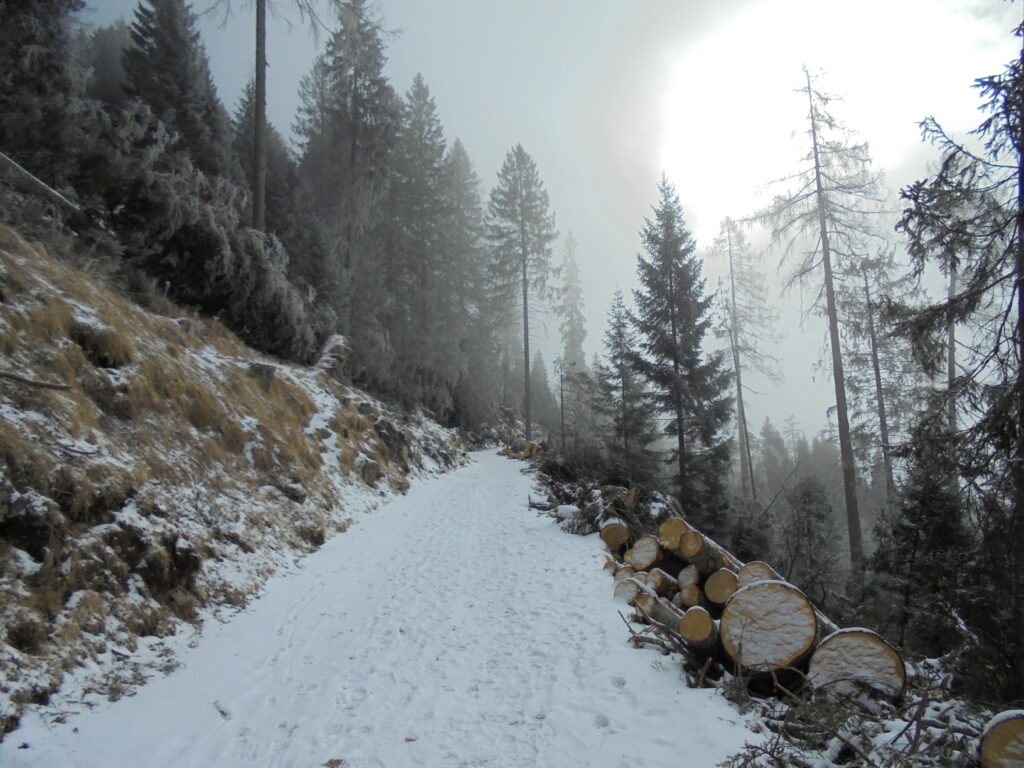Texte disponible en anglais, en allemand et en italien.
In the area of syntax, there are many notable differences between standard Italian and the Italo-Romance dialects. In this section we will look at how weather verbs are formed in the dialects spoken in the region of Veneto and the autonomous province of Trento, based on the article by Tomaselli & Bidese (2023). To say ‘it has snowed’ in Italian, one would say ha/è nevicato. However, in the dialects spoken in Trento (as well as in some Venetan varieties), you would have to add in the clitic pronoun el or l’ (known as either expletive or impersonal subject pronoun) to form a grammatical sentence. So instead of standard Italian ‘ha/è nevicato‘ (has/is snowed), in many dialects you might find something like ‘L‘a nevegà‘ (it has snowed). Audio files collected in the AlpiLinK and VinKo projects, confirm this: listen to the sentences in (1) for two examples from the province of Trento.
(1) L‘a fiocà (it has snowed) /a le aute l‘a flocà e a le basse l‘a plovu (up in the mountain it has snowed and down in the valley it has rained)
The use of the expletive with a weather verb is however much more common in the Trentino dialects than in the Venetan dialects. In the Trentino dialects 85,7% of speakers produces the impersonal subject, whereas this form is only found in the provinces of Verona and Vicenza (respectively 29,9% and 20%), but not in Padova or Venezia (Tomaselli & Bidese 2023:12). With the additional data from AlpiLinK, we can find attestations from other provinces within Veneto as well, like for example from the province of Treviso (2.3, Cavaso del Tomba).
(2) L’a nevegà (it has snowed) / in alto in montagna l‘a nevicà e in basso l‘a piovuo / su in montagna l’a nevegà e giu in fondo l‘a piovest (up in the mountain it has snowed and down in the valley it has rained)
It has been proposed that contact with German and a superficial resemblance of the pattern might have played a role in preserving these expletives in the Trentino dialects (Tomaselli & Bidese 2023:16). The use of this so-called expletive with weather verbs is common in languages such as English (it has snowed), standard German (es hat geschneit) and also in the Germanic varieties historically spoken in Trento and the Veneto. The expletive z is found in the Cimbrian varieties spoken in Lusèrn (TN) and Letjzan/Giazza (VR), illustrated in example (3).
(3) z hatt gesnibet (it has snowed) / au hoach affn perge hatz gesnibet un ledrå hatz gerenk / au tze perge hatz gasnaibat un nidar hatz garegat (up in the mountain it has snowed and down in the valley it has rained)
References
- Rabanus, Stefan, Anne Kruijt, Marta Tagliani, Alessandra Tomaselli, Andrea Padovan, Birgit Alber, Patrizia Cordin, Roberto Zamparelli & Barbara Maria Vogt (2022): VinKo (Varieties in Contact) Corpus v1.1. Bolzano-Bozen: ERCC.
- Rabanus, Stefan, Anne Kruijt, Birgit Alber, Ermenegildo Bidese, Livio Gaeta & Gianmario Raimondi. 2024. AlpiLinK Corpus 1.1.2. In collaboration with Paolo Benedetto Mas, Sabrina Bertollo, Angelica Bonelli, Jan Casalicchio, Raffaele Cioffi, Patrizia Cordin, Silvia Dal Negro, Alexander Glück, Joachim Kokkelmans, Adriano Murelli, Andrea Padovan, Aline Pons, Matteo Rivoira, Marta Tagliani, Caterina Saracco, Alessandra Tomaselli, Ruth Videsott, Alessandro Vietti & Barbara Vogt. DOI:10.5281/zenodo.11352290.
- Tomaselli, Alessandra & Ermenegildo Bidese (2023): Fortune and decay of lexical expletives in Germanic and Romance along the Adige River. Languages 8(1), 44.
Note: Thanks to R. Ferracin for the Cimbrian transcriptions in examples (3.2) and (3.3).

